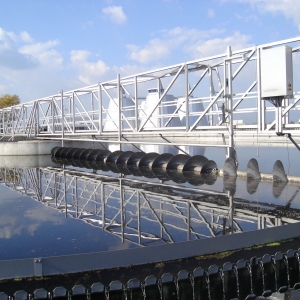The Stream, August 4, 2021: Experts Say Rising Sea Levels and Flooding Could Make Lagos Uninhabitable
YOUR GLOBAL RUNDOWN
- Nigeria is facing a cholera outbreak in a region whose health systems are least equipped to handle it.
- Lagos, Nigeria, could be uninhabitable by the end of the century as flooding events worsen and sea levels continue to rise.
- British Columbia, Canada is forcing most groundwater users to apply for a license and pay fees to continue using their water.
- Officials in North Dakota are promoting a decades-long project to pipe Missouri River water to drought-affected areas.
Experts say Iran’s water crisis will only worsen if the country continues to rely on hydropower generation.
“Climate change and drought is a catalyst here. But the problem is rooted in decades of bad management, poor environmental governance and lack of foresight, and not getting prepared for a situation like this.” – Kaveh Madani, former deputy head of the Iranian Environment Department. The Iranian Meteorological Organisation warned of “unprecedented drought” earlier this year, BBC reports. Since then, water shortages and hydroelectric power cuts have spurred violent protests in many cities. Experts say that Iran’s water crisis is bound to worsen as hotter and drier weather continues to impact hydropower generation. Although climate change has brought the crisis to the forefront, the roots of Iran’s water crisis can be found in long-term issues with water management that have led to one of the worst groundwater depletion rates in the world.
IN RECENT WATER NEWS
In Case You Missed It:
HotSpots H2O: Indigenous Communities, Biodiversity Along Brazil-Peru Border Threatened by Highway Construction – Canopied by rubber trees and sprawling vines with apple-sized nuts, Acre state in northwest Brazil frames earth’s portrait of natural beauty. And lurching too across Acre state, a highway heaves its concrete girth.
What’s Up With Water – August 2, 2021 – This week’s episode covers deadly protests over water shortages in Iran, an emergency declaration in Argentina amid dwindling water levels in a major waterway, Saudi Arabia’s suspension of a multi-billion-dollar sale of a stake in the world’s largest desalination plant, and record lows in the second-largest reservoir in the United States.
Rising Sea Levels and Erosion Threaten To Drown Lagos
Lagos, Nigeria, may become uninhabitable by the end of the century as sea levels rise due to climate change, CNN reports. Although the country is used to an annual rainy season between March and November, this month, the country experienced one of its worst floods in recent years. Experts say flooding events are worsening as the nation’s coast continues to erode, putting coastal cities at risk of being totally submerged by 2100.
TODAY’S TOP WATER STORIES, TOLD IN NUMBERS
22 NIGERIAN STATES
The Nigeria Centre for Disease Control said that 22 of Nigeria’s 36 states have suspected cases of cholera, a waterborne illness that can kill within hours if not treated. Reuters reports that the surge has been focused in north Nigeria, where health systems are the least prepared.
4,125 GROUNDWATER USERS
In an effort to manage groundwater resources, officials in British Columbia are mandating groundwater users for agriculture, industry or business to apply for a license and pay fees. But so far, only 4,125 existing water users have applied. The Tyee reports that if that pattern holds and the law is enforced, users without licenses would be barred from using any groundwater. This, experts say, could have major consequences on the economy, food security, and individual water users.
ON THE RADAR
Officials in North Dakota are promoting an idea to pipe water from the Missouri River across the state to central and eastern North Dakota. The Associated Press reports that the proposal is decades in the making, but the billion-dollar project still faces huge funding and legal hurdles before water can be tapped during drought emergencies.
Jane is a Communications Associate for Circle of Blue. She writes The Stream and has covered domestic and international water issues for Circle of Blue. She is a recent graduate of Grand Valley State University, where she studied Multimedia Journalism and Women, Gender and Sexuality Studies. During her time at Grand Valley, she was the host of the Community Service Learning Center podcast Be the Change. Currently based in Grand Rapids, Michigan, Jane enjoys listening to music, reading and spending time outdoors.







Leave a Reply
Want to join the discussion?Feel free to contribute!